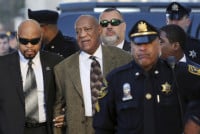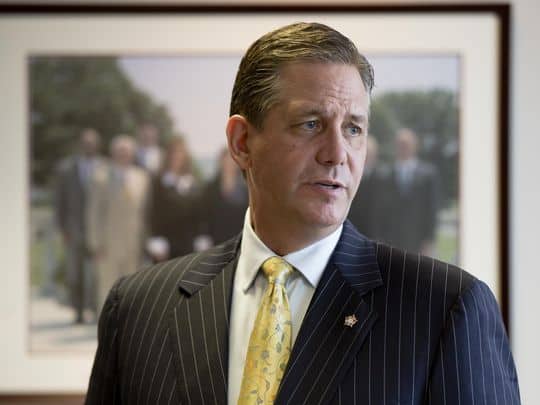Scheme Victimized More Than 1,000 Individuals Throughout the United States
LawFuel.com – Lawyer and Law Firm News – Preet Bharara, the United States Attorney for the Southern District of New York, and Benjamin C. Mizer, the Principal Deputy Assistant Attorney General of the Justice Department’s Civil Division, announced that KENNETH LEVIN, the owner of a company that purported to sell lucrative vending machine “business opportunities,” and his son and manager at the company, TAYLOR LEVIN, were found guilty yesterday for their participation in a nearly $11 million scheme that victimized at least 1,300 consumers across the country. KENNETH LEVIN and TAYLOR LEVIN were convicted after a three-week jury trial before the Honorable Katherine B. Forrest. The defendants were arrested in March 2015 along with five other co-conspirators who have all pled guilty.
Manhattan U.S. Attorney Preet Bharara said: “Kenneth and Taylor Levin preyed upon the entrepreneurial resolve of thousands of victims across the country, deceiving them with promises of business assistance and giant windfalls, when instead they were duping the victims out of over ten million dollars. This three-week trial and the unanimous verdict made clear that the business opportunities Kenneth and Taylor Levin were selling to their victims were actually for themselves alone. I want to thank the U.S. Postal Inspection Service and the Consumer Protection Branch of the Justice Department for their assistance in this prosecution.”
Principal Deputy Assistant Attorney General Benjamin C. Mizer said: “The defendants convicted in this case twisted the American entrepreneurial spirit to their advantage, luring consumers with the prospect of starting their own business and being their own boss. Justice Department prosecutors will continue to team together and work with law enforcement to ensure that the crime of business opportunity fraud, in all of its forms, is stopped and perpetrators are prosecuted.”
As established by the evidence at trial:
From January 2005 to December 2011, KENNETH LEVIN and TAYLOR LEVIN and their co-conspirators perpetrated a scheme to defraud consumers by making material misrepresentations in an effort to induce those consumers to invest thousands of dollars in purported vending machine “business opportunities.” Through a company located in Manhattan, New York (“Company-1”), and its successor companies (together, the “Business Opportunity Companies”), the defendants and other employees falsely promised customers that if they purchased packages of five or 10 vending machines, the customers would be provided access to established, high-profit locations for the machines, and would be connected with experienced “locators,” who would facilitate placing the vending machines in those pre-determined locations. The defendants and other employees further falsely promised to provide training and ongoing customer assistance on how to operate a successful vending machine business, and misled customers about the features of the vending machines – including purposefully concealing the fact that the machines were manually operated and accepted only exact change, rather than automatic machines that accept bills and provide change. Despite the defendants’ claims, there were no pre-determined locations available, locators were inexperienced and ill-equipped to find profitable locations for the vending machines, and the Business Opportunity Companies delivered little or no follow-up service or assistance to their customers.
The defendants also misled prospective customers about the profits customers could earn from the machines. Prospective customers were assured that they would earn significant profits from the vending machines in a relatively short period of time. Customers were also misled into believing that certain employees of the Business Opportunity Companies personally owned vending machines that were profitable. The defendants and their co-conspirators made these assertionsknowing that there were scores of dissatisfied customers who, rather than making any profit, had lost their entire investment. Through their scheme, the Business Opportunity Companies obtained nearly $11 million from more than 1,300 customers throughout the United States.
The Business Opportunity Companies also encouraged prospective customers to contact the locators to verify that the purported locations were available. The locators were directed to echo the false statements made to customers and affirm that high-traffic, and therefore profitable, locations had already been found and were waiting in the prospective customers’ respective geographic areas. In reality, the locators who worked with the Business Opportunity Companies did not have high-traffic locations or routes waiting in the prospective customers’ areas. The locators had no special skills, tools, or expertise in finding locations and generally placed consumers’ machines wherever they could, often in businesses that had not consented to housing the machines or that soon demanded that the machines be removed. The vending machines generated little money and customers lost nearly all, if not all, of their investments.
KENNETH LEVIN, the founder and President of the Business Opportunity Companies, operated and controlled the Business Opportunity Companies’ day-to-day operations. To acquire customers, the Business Opportunity Companies placed advertisements in newspapers throughout the country, claiming that the Business Opportunity Companies had high-profit locations available for the placement of vending machines. Prospective customers responding to the advertisements were sent misleading promotional materials and also spoke by telephone with representatives of the Business Opportunity Companies, including KENNETH LEVIN’s son, TAYLOR LEVIN. Both defendants made various misrepresentations as described above to induce customers to buy the vending machine “business opportunity.” The defendants further concealed from prospective customers the fact that the Business Opportunity Companies received numerous complaints from customers about the lack of profitability of the vending machine “business opportunities” they were selling and the locators’ complete failure to place the vending machines in profitable locations. In an effort to conceal customer complaints from prospective customers, the Business Opportunity Companies changed their names regularly, both to avoid association with previous complaints, and to evade a federal law requiring them to provide prospective customers with a list of recent customers.
* * *
KENNETH LEVIN, 69, and TAYLOR LEVIN, 34, both of Manhattan, New York, were found guilty of all three counts in the Indictment: one count of conspiracy to commit mail fraud and wire fraud, and one count each of mail fraud and wire fraud. Each count carries a maximum sentence of 20 years in prison. KENNETH LEVIN’s sentencing is scheduled forApril 1, 2016, and TAYLOR LEVIN’s sentencing is scheduled for April 15, 2016, both before Judge Forrest. The maximum potential sentences in this case are prescribed by Congress and are provided here for informational purposes only, as any sentencing of KENNETH LEVIN and TAYLOR LEVIN will be determined by the court.
The five other individuals arrested along KENNETH LEVIN and TAYLOR LEVIN on March 5, 2015, have pled guilty before Judge Forrest for their respective roles in this scheme.
Sears Hobbs pled guilty on January 4, 2016, and is scheduled to be sentenced on March 11, 2016.
James Conley pled guilty on October 22, 2015, and is scheduled to be sentenced on February 11, 2016.
Marcel Harris pled guilty on October 26, 2015, and is scheduled to be sentenced on February 26, 2016.
Stephen Friedman pled guilty on October 27, 2015, and is scheduled to be sentenced on February 26, 2016.
Jonathan Campbell pled guilty on September 17, 2015, and is scheduled to be sentenced on February 12, 2016.
Mr. Bharara praised the United States Postal Inspection Service (“USPIS”) for their outstanding work in the investigation. Mr. Bharara also thanked the Consumer Protection Branch of the Justice Department’s Civil Division for its valuable contributions to this case.
This matter is being handled by the Office’s Complex Frauds and Cybercrime Unit. Assistant U.S. Attorneys Janis Echenberg and Jennifer Beidel are in charge of the case.

